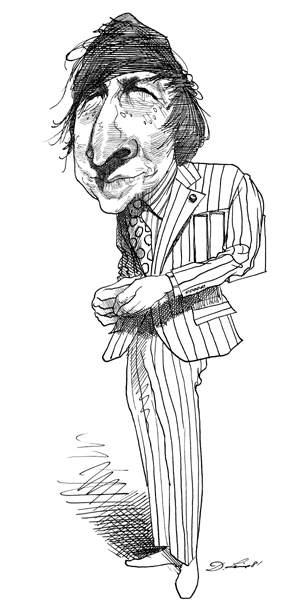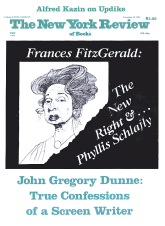Rabbit Is Rich, the third of John Updike’s romances with his favorite hero, Harry Angstrom (and with Harry’s and our acceleration from discontent to dismay), is a brilliant performance. As always, but more soberly and relevantly than in such subjective books as Couples and Marry Me, Updike revels in his great gifts of style and social—I mean domestic—observation. There have been times in the past when Updike’s style was laid across the page like so many layers of marshmallow. How the prodigy loved his style! But here the always summonable Updike brightness, acuity, prancing wit are mostly on the mark. And the mark is inflation, inflated America careening wildly like an overpressured balloon over the pit of the Seventies.
Apart from the helplessness of the characters, just as drugged by the social fix as some kid on Lenox Avenue, Updike’s own proud voice rings out with a new steeliness—and pronounced lamentation—about a rich, wasteful, wholly selfish, and hard-talking America whose advantage to a writer is that it is always news. That these brilliant touches will remain news I am not sure. What is sure is that we busy, yammering hedonists have lost nothing but confidence. Here is the scene not far from the Toyota agency that Rabbit took over from his dead father-in-law:
Fast-food huts in eye-catching shapes and retail outlets of everything from bridal outfits to plaster birdbaths have widened the shoulders of this, the old Weisertown Pike, with their parking lots, leaving the odd old house and its stump of a front lawn sticking out painfully. Competitors Pike Porsche and Renault, Diefendorfer Volkswagen, Red Barn Mazda and BMW, Diamond County Automotive Imports—flicker their FUEL ECONOMY banners while the gasoline stations intermixed with their beckoning have shrouded pumps and towtrucks parked across the lanes where automobiles once glided in, were filled, and glided on. An effect of hostile barricade, late in the day. Where did the shrouds come from? Some of them quite smartly tailored, in squared-off crimson canvas. A new industry, gas pump shrouds. Among bitter lakes of asphalt a few small stands offer strawberries and early peas.
I don’t remember another novelist nothing these “shrouds.” If one did, I’m sure he didn’t extend his attention to “Some of them quite smartly tailored, in squared-off crimson canvas.” Rabbit Is Rich is more inclusive of the middle-American mores in a middle-sized town (“Brewer” in 1979), and is wittier about the Middle America layer, than anything since 1922 and Babbitt. That is a book Updike (born ten years later) wants you to read still; he quotes from the book and parodies Babbitt’s own father-son relationship (a cheerful one on the whole) in the abrasive gap between Rabbit and his theatrically immature son Nelson.
Sixty years after Sinclair Lewis’s one living book, this is where we are now. Nothing, as they say, has escaped the notice of John Updike, a writer naturally lush in sensibility but as pitiless of eye as Mencken. Harry, whom we first met running, running, now stands around old Springer’s Toyota agency smirking over “an average gross markup of eight hundred dollars per sale. Rabbit is rich.” The six-foot-three former basketball star now weighs around two-ten, has a forty-two waist, and avoids mirrors, when he used to love them. There is such a line-up in front of the gas pumps that his mother-in-law had her tank drained dry in front of the hair-dresser’s. A woman lined up for gas had her hip broken, and when her husband went to her rescue, they were ignored by the crowd rushing to her place.
Rabbit surveys all this (at first) with surface equanimity; he is pulling in over fifty thou. The walls around the imitation pine boards framing the way into his office are hung with old clippings from his basketball days and team portraits. His late father-in-law (who would have thought that such a little tense busy bird of a man could get it up for a massive coronary) loved to talk Republican, and when Nixon left him nothing to say he had kind of burst. Harry’s face far behind him, with sleepy predatory teen-age eyes in the glossy team portraits, exists in his present face like the chrome bones of a grille within the full front view of a car and its fenders.
Updike pretending to be Rabbit is also very good on the shopping malls hacked from the former fields of corn, rye, tomatoes, cabbages, and strawberries. On the downtown wasteland in city after city. On why Barbra Streisand’s “Jewish” voice and nose excite the American public. On the Pinnacle Hotel, now a site of vandalism and terror where once there had been dancing and necking.
Something about spics they don’t like to see white kids making out, they surround the car and smash the windshield with rocks and slit the clothes off the girl while roughing up the boy…. In the park a World War II tank, made into a monument, points its guns at tennis courts where the nets, even the ones made of playground fencing, keep getting ripped away. The strength these kids use just to destroy. Was he that way at that age? You want to make a mark. The world seems indestructible and won’t let you out.
Rabbit’s opening smirk fades page by page. He and wife Janice are reconciled (you will remember that Janice when drunk accidentally let baby Rebecca drown in the bathtub), but though active in bed are not really together. Janice has grown hard, and not just from playing tennis; they are divided by their son Nelson’s dropping out of Kent State and wanting to replace Charlie Stavros, Janice’s lover ten years ago, as sales manager of the Toyota agency. And they still live with Janice’s mother in her house.
Advertisement
Standing around all day, Rabbit daydreams of a stone house with exposed beams, sunken living room. Standing around Charlie, Rabbit sometimes pictures Charlie being inside Janice. “A man fucks your wife, puts a new value on her, within limits.” Rabbit is less enthusiastic these days about Janice’s parts than she is about his. When he puts aside Consumer Reports, April issue, at her urging, he is encouraged by her avidity but sees “the hateful aged flesh at the base of her throat.” What the New World was to Renaissance cartographers, sex is to Updike. No one has put so many coasts, bays, and rivers where once there was only silence. It is all steamy but not exactly stimulating, for Updike’s bond to Babbitt is that everything (even the once) unthinkable wife-swapping) is now domestic. The details may startle anyone born before 1932, but the flavor is more of pots and pans, the bathroom mirror, and even the toilet bowl, than of voluptuousness.
And on this favorite subject Updike’s merciless attention and packed style do get in the way. The thoughts are supposed to be the thoughts of Rabbit, but no husband bored with making love will be distracted enough to think all this. The voice is the voice of Updike. “The affair with Charlie Stavros opened her up at about the time of the moon shot.”
Guiltily he tries to count up how many nights he’s given her an orgasm. These July nights, you get thirsty for one more beer as the Phillies struggle and then in bed feel a terrific weariness, a bliss of inactivity that leads you to see how man can die willingly, gladly, into eternal release from the hell of having to perform. When Janice hasn’t been fucked for a while, her gestures speed up, and the thought of Charlie’s coming intensifies this agitation.
This busy marriage bed finally gets as romantic as the April issue of Consumer Reports as Rabbit responds to Janice’s—new wantonness. The key sentence, though of course it is not really true, is, “Each day he is a little less afraid to die.” Because what this “Rabbit” is really about is no longer running, running out of the social fix, but the decay that is never so much noticed as when you are looking, post coitum homo triste est, at the beloved’s flabby buttocks. Not inflation, not the gas crunch of 1979, but the dying of the national dream in the emission indeed of Rabbit’s own hope, reflexes, and confidence. A felt lack of continuity is the pervasive fact. Rabbit keeps looking for the daughter he thinks he had by an old girlfriend. There is no daughter, or if there is one, old friend will never gratify him by admitting it. Rabbit yearns back to the world of tenderness and solidarity typified by his printer father, and his modest style of life, and by his dead mother’s plainness of speech.
The ominous figures of speech in this book so rich with Updike figures are of the body. Rabbit surrounded by his own girth as well as by his golfing friends (who all talk like TV commercials and newscasters), by the ravages of the city, by the impossibility of Arab sheiks, Big Oil, etc., has no tie to his dropout son Nelson, who delights in damaging Rabbit’s car. While willing to marry Pru, whom he has made pregnant back at Kent State, Nelson is sleeping with Pru’s friend Melanie, an intellectual and feminist whose interest in him is condescending but unaccountable. There was no daughter, there is not much of a son, and Rabbit making love is aware of wrong smells from Janice’s feet.
Advertisement
Death and death and death dominate (in thought) a life outwardly rich and so emancipated that (this time parodying Frank Norris’s McTeague) Rabbit and Janice make love surrounded by their newly acquired Krugerands. The wonderful wife-swapping episode turns so domestic that the lady (a neighbor) ends up usefully advising Rabbit about wife and son. Updike and Rabbit are the same age: on the threshold of fifty. Rabbit is running scared. America and Americans in this book are nervously, prematurely apprehensive. Things are out of “control.” Everyone knows that society is “crazy,” beyond the interpretation even of those who have no cause for complaint, no cause whatever. For they recognize that while they are being led by the nose, events are thrillingly nervous, dramatic, like the news every hour on the hour, like the gallows humor at the club, like the revelations on TV of the great—whose facial expressions are as exposed to us as another body in bed.
Does the fierceness of detail in Rabbit Is Rich argue a need to hold on in this horribly evanescent scene? Babbitt was about the difference between private illusion and social truth. No illusion is left in “Brewer.” Everybody is wise, smart, money-smart; everybody, even the women who gain psychic “equality” by this, talk dirty. Goofy son Nelson finally marries pregnant Pru, as at the end of Babbitt Babbitt’s son alarms the family but puts new backbone into his Pa by marrying just as he likes. But in Babbitt the son gives the father some independence at last; in Rabbit Is Rich Nelson knocks a nail into Rabbit’s coffin by presenting him with a granddaughter. Even Updike’s most familiar figure of speech, “God,” makes a less certain appearance in this book than He usually does. He is unmistakably ticked off as the author of death and, like the salt in the ocean, what gives life (and death?) its taste.
A brilliant book, this, and though a chastening one, what we deserve. And the clearest case we have had for some time that novelists are as much led around by the nose as everybody else these days. Will this book remain “news” as long as Babbitt has? Not if the fierceness of detail is there just to hold on to something in all this easy come and easy go—this perpetually passing society where you can’t even count on empty gas pumps wearing “shrouds.”
This Issue
November 19, 1981




